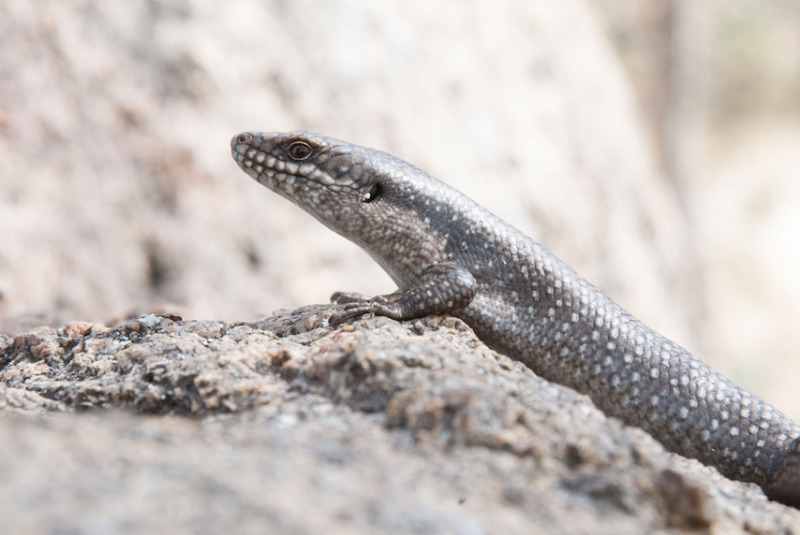Credit: Associate Professor Martin Whiting, Macquarie University.
In a new study of lizard social behaviour, researchers at Macquarie University have discovered that despite their social nature, family-living lizards do not necessarily thrive in a 'share-house' environment.
The study found that much like other social animals, like humans, other mammals, and birds, Australian Tree Skinks (Egernia striolata) rely on social experiences and interactions with others to guide their development while growing up.
In the study published in Royal Society Open Science, lizards were raised alone or paired with another juvenile, and researchers measured their 'personality' (sociability, boldness, and aggression), as well as the type of relationship that each lizard formed with its 'roommate.'
The researchers expected that growing up alone would negatively affect tree skink behavioural development, however, they found that the lizards who were raised alone were not affected negatively in the way that often affects family-living birds and mammals.
"We found that in lizards raised with a roommate, a dominant-subordinate – or 'bullying' – relationship formed, and this relationship affected both the physical and behavioural development of the skinks. The dominant skinks became bolder as they aged, perhaps because as they grew larger or 'won' in more social interactions they were more likely to exhibit risky behaviour," said Julia Riley, lead author of the study.
In contrast, subordinate skinks were the least social and increased in aggression over time, perhaps suggesting that after aggressive encounters with their roommate these skinks may have learnt to avoid social interactions and react aggressively to fellow lizards.
"Our study's findings show that feedback in social relationships affects juvenile development – and particularly subordinate tree skinks within a pair appeared to pay the price of living with a dominant roommate," said Riley.
Despite the interest in the role of experience in the development of social behaviour in birds and mammals, there has been limited research on how early social experience influences later social behaviour, in reptiles.
"Family-living is remarkably rare in lizards, so tree skinks offer a unique opportunity to study how early social experience influences development. Previous studies on social mammals and birds have found that growing up alone causes individuals to be more fearful, more anxious, and less social. These differences in behaviour also can impact an individual's survival and mating success," said co-author of the study, Associate Professor Martin Whiting.
The study shows that a lizard's early social experience – either positive or negative – affects its development, reflecting a similarity to the human experience.
"These findings are important for reptile conservation and management projects, and ethical considerations at zoos and aquaria," concluded Riley.
More information: Julia L. Riley et al. Early social environment influences the behaviour of a family-living lizard, Royal Society Open Science (2017). DOI: 10.1098/rsos.161082
Journal information: Royal Society Open Science
Provided by Macquarie University






















